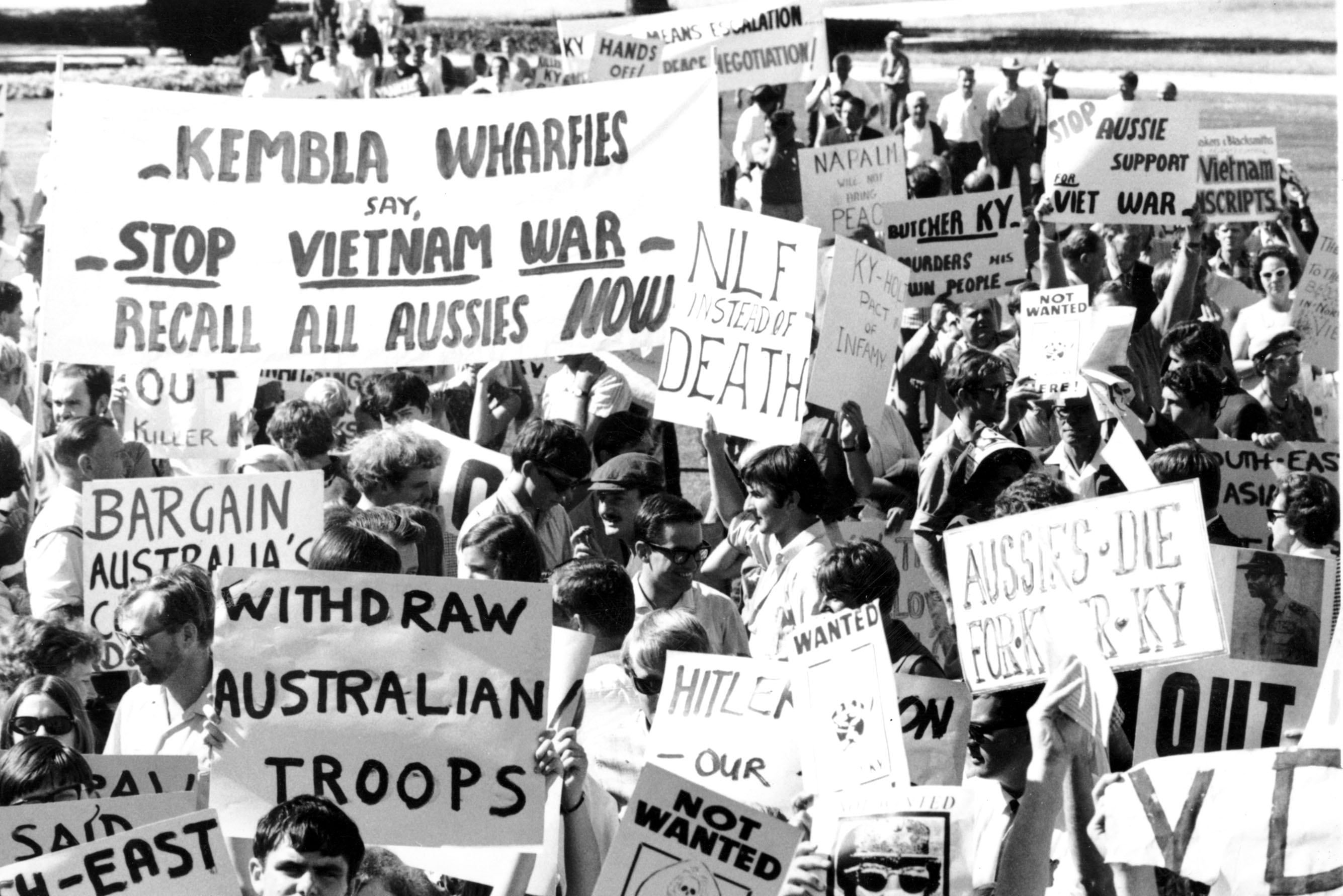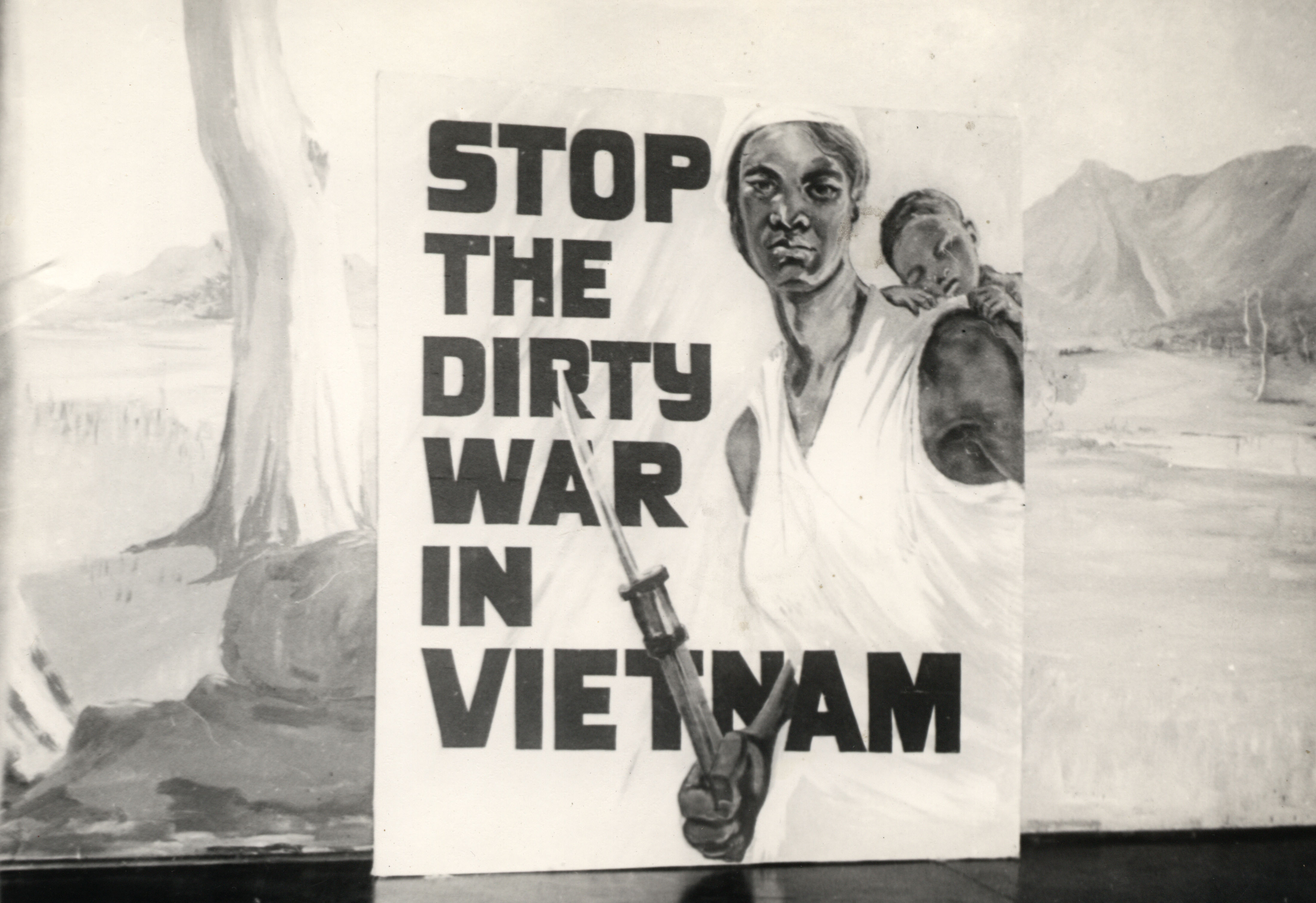Opposition to the War in Vietnam
Trade union opposition to the war in Vietnam began even before Australia announced it would be sending troops to the conflict in 1965. The Waterside Workers' Federation was one of the earliest trade unions to take action when members staged a 24-hour strike in Sydney in April 1965 to protest the United States’ involvement (Saunders 1982, p. 65). Shortly afterwards, 2,500 members of the Melbourne Branch walked off the job to protest against Australian involvement.
Appeals by the WWF to the Australian Council of Trade Unions to support a 24-hour nationwide stoppage by waterside workers were rejected, with the ACTU opposed to the decision to send Australian troops to Vietnam but not keen to support any industrial action that may affect the flow of supplies to our troops.
In May 1966, the Seamen's Union of Australia refused to crew the M.V. Boonaroo, which had been chartered by the Federal Government to transport stores and equipment to Vietnam. The decision was widely condemned by other unions, including the Marine Stewards’ Union, Marine and Power Engineers’ Institute and Merchant Service Guild. The WWF, which usually enjoyed solidarity with the SUA, made the decision to supply labour to load the ship. SUA leader E.V. Elliott argued that the union’s decision was based on an objection to civilians, merchant seamen in this case, being brought into the war (Saunders 1982, p. 67). Faced with strong opposition, the SUA reversed their decision and the ship left Sydney fully crewed on 26th May.
The matter again came to a head in 1967, when the SUA refused to crew M.V. Boonaroo and M.V. Jeparit. In February, SUA members walked off the job when they learned the ships were transporting munitions, arguing that this should be done by Royal Australian Navy vessels. The Federal Government agreed to commission Boonaroo and operate it with a RAN crew, which was the first time in Australian history that a merchant ship was commissioned for the Navy because of an industrial dispute (Saunders 1982, p. 68). Similarly, the SUA refused to crew Jeparit, claiming that its members voted overwhelmingly not to crew a ship that was carrying munitions. The Jeparit eventually left Sydney crewed by a mix of RAN sailors and civilians.
By 1969, there was some change in the opposition to the conflict from the broader trade union movement. This included short strikes by Sydney and Melbourne WWF members. The arrest of Laurie Carmichael, Secretary of the Amalgamated Engineering Union Victorian Branch, during an anti-conscription protest, led to industrial action by thousands of union members.
In November 1969, WWF Sydney Branch members refused to unload Jeparit after its return from Vietnam, in defiance of both WWF and ACTU directives. The workers stated the boycott was protesting the alleged massacre of Vietnamese civilians in My Lai. Whilst the workers eventually agreed to unload the ship, they would not reload it, and yet again the government was forced to commission a ship and both load and crew it with RAN sailors. By December, the wharfies had gained the support of the WWF as well as boilermakers, tug deckhands, engineers and wharf watchmen, who all banned the Jeparit (Saunders 1982, p. 70).
In December 1969, a meeting of 300 officials representing 32 trade unions passed a resolution calling on national servicemen in Vietnam to “lay down their arms in mutiny against the heinous barbarism perpetrated in our name upon innocent men, women and children” (Saunders 1982, p. 70). This action was widely condemned on all sides of politics and the ACTU, now led by future Prime Minister Robert (Bob) Hawke.
Trade union opposition grew stronger as the war continued. When the United States (US) made its heaviest bombing attacks around Hanoi and Haiphong in 1972, Australian maritime unions threatened to ban all US ships. The SUA went further, informing US President Richard Nixon that the union was placing an Australia-wide ban on all US ships. Various maritime unions showed solidarity, with ten unions advising that unless Nixon signed a peace agreement they would impose bans, which is exactly what occurred. This action outraged numerous business organisations and conservative politicians, but was well supported by other trade unions, who threatened their own bans on US trade and projects as well as the supply of some Australian products to the US. On 3rd January 1973, the US retaliated by banning all Australian ships, threatening millions of dollars of trade. Shortly afterwards, Hawke as head of the ACTU, negotiated with the SUA to lift the ban while peace talks occurred and by mid-January, the SUA and all other maritime unions agreed to lift their bans provided they could reinstate them should peace talks break down. On 27th January 1973, a ceasefire agreement was signed and the war in Vietnam was over.
References
Saunders, M 1982, ‘The Trade Unions in Australia and Opposition to Vietnam and Conscription: 1965-73’, Labour History, No. 43, <https://www.jstor.org/stable/27508548>

















